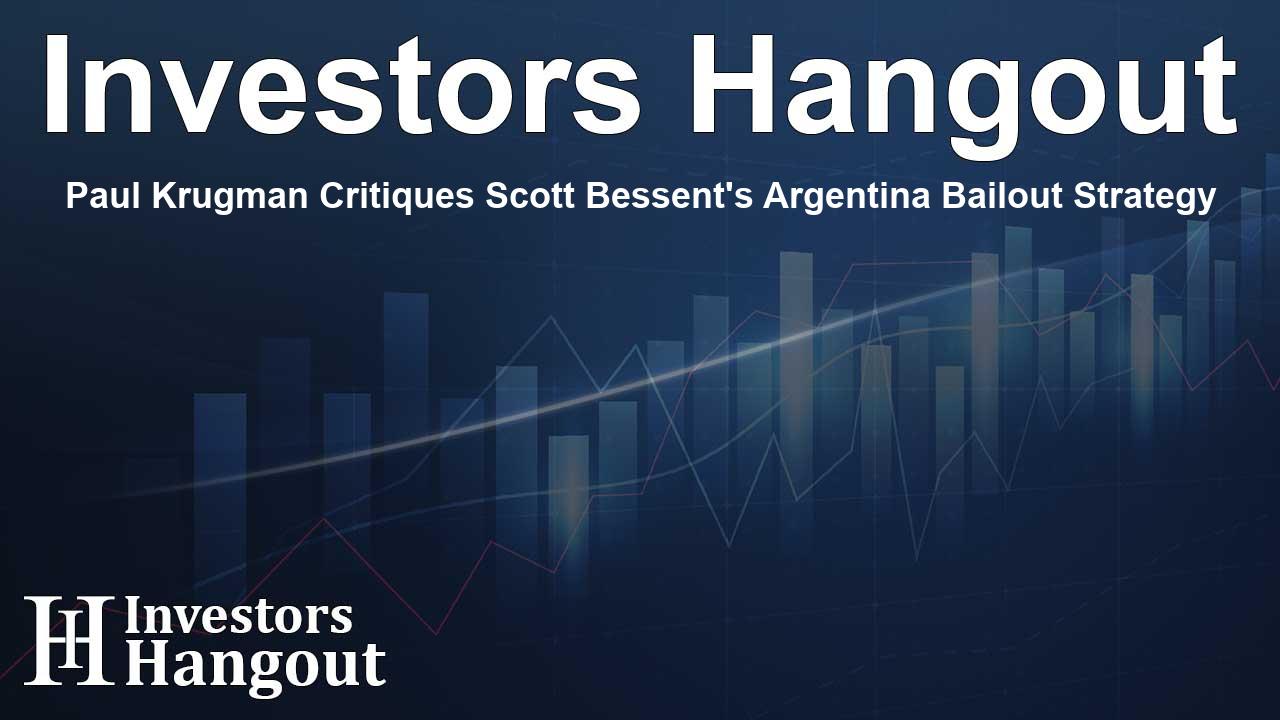Paul Krugman Critiques Scott Bessent's Argentina Bailout Strategy

Controversy Surrounds Argentina's Bailout and Its Backers
Nobel Prize-winning economist, Paul Krugman, has been vocal about his disapproval of U.S. Treasury Secretary Scott Bessent's proposed $20 billion aid package for Argentina. Krugman suggests that the funding primarily serves the interests of Bessent's hedge fund allies instead of fulfilling strategic needs for the U.S.
A Fund for Hedge Fund Professionals?
In his latest newsletter, Krugman elaborated on his view that the current administration seems to prioritize supporting wealthy investors over humanitarian aid. He specifically referred to the Argentine President, Javier Milei, likening him to a South American version of Elon Musk, emphasizing the irony in an American administration that traditionally opposed foreign aid.
As Krugman put it, many lives are at stake, while U.S. taxpayers will be burdened with the costs of bailing out wealthy fund managers. His statements point to a stark contrast between fiscal priorities and genuine assistance during a humanitarian crisis.
Krugman has gone as far as to amend his previous stance, which he characterized as insufficiently cynical. He now believes the aid is not just ideologically driven but also influenced by the financial interests of certain hedge fund managers, particularly Rob Citrone, a billionaire investor closely tied to Bessent. Citrone's substantial investments in Argentine assets raise questions about the motive behind the financial support.
Taxpayer Dollars Supporting Inflationary Measures
Citing analysis by Matthew Klein, Krugman argues that U.S. taxpayer funds are essentially being utilized to stabilize the Argentine peso. This artificial support allows hedge fund managers to sell off Argentine assets at inflated prices—only for the peso to inevitably drop again, thus creating a precarious economic cycle.
Furthermore, Krugman has expressed skepticism about the effectiveness of the proposed $20 billion in U.S. loans. He argues there’s no reasonable scenario in which this funding could salvage Milei's troubled economic strategy, labeling Bessent's justifications as pure conspiracy theory.
U.S. Farmers Voice Discontent Over Bailout Decisions
The implications of this financial support have drawn severe criticism not just from economists, but also from American farmers. Senator Chuck Grassley highlighted the backlash from American soybean farmers who feel betrayed by the government for providing financial aid to Argentina while it continues to export soybeans to China.
Farmers, who previously enjoyed a dominant position in the market, now find themselves undercut by Argentina, especially amid trade tensions ignited by Trump's policies. This has caused considerable distress among U.S. agricultural producers who see their livelihoods jeopardized while taxpayer dollars are channeled into foreign aid.
Political Reactions to Financial Aid
The response to the bailout extends beyond farmers to notable U.S. politicians as well. Senator Elizabeth Warren has criticized the aid initiative, arguing that instead of using taxpayer money to support foreign currencies, the administration should focus on domestic issues like healthcare.
Conclusion and Outlook
The dynamics around the $20 billion bailout for Argentina continue to stir heated discussions among economists, politicians, and farmers alike. The debate raises important questions about fiscal responsibility, humanitarian aid versus financial interests, and the overall strategy of U.S. foreign aid policies. As Krugman and others rally around their critiques, the future of economic relations between the U.S. and Argentina remains uncertain.
Frequently Asked Questions
What sparked Paul Krugman's criticism of the bailout?
Krugman criticized the bailout as being more about benefitting hedge fund managers than addressing humanitarian issues in Argentina.
Who is Rob Citrone in relation to this story?
Rob Citrone is a billionaire hedge fund manager associated with Scott Bessent, presumed to benefit from the Argentine aid package.
How are American farmers reacting to the bailout?
American soybean farmers are upset, feeling that their government is prioritizing foreign aid over domestic agricultural interests.
What does Krugman say about the effectiveness of the $20 billion aid?
He argues that there is no plausible scenario in which this amount can effectively resolve Argentina’s economic issues.
What alternatives does Senator Elizabeth Warren suggest instead of the bailout?
Warren suggests that U.S. taxpayer dollars should address domestic issues, such as healthcare, rather than foreign currency aid.
About The Author
Contact Owen Jenkins privately here. Or send an email with ATTN: Owen Jenkins as the subject to contact@investorshangout.com.
About Investors Hangout
Investors Hangout is a leading online stock forum for financial discussion and learning, offering a wide range of free tools and resources. It draws in traders of all levels, who exchange market knowledge, investigate trading tactics, and keep an eye on industry developments in real time. Featuring financial articles, stock message boards, quotes, charts, company profiles, and live news updates. Through cooperative learning and a wealth of informational resources, it helps users from novices creating their first portfolios to experts honing their techniques. Join Investors Hangout today: https://investorshangout.com/
The content of this article is based on factual, publicly available information and does not represent legal, financial, or investment advice. Investors Hangout does not offer financial advice, and the author is not a licensed financial advisor. Consult a qualified advisor before making any financial or investment decisions based on this article. This article should not be considered advice to purchase, sell, or hold any securities or other investments. If any of the material provided here is inaccurate, please contact us for corrections.
